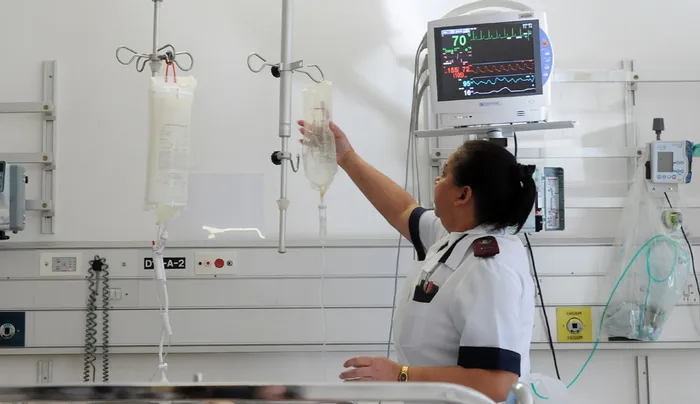Court dismisses patient’s claim over faulty drip

A nurse checks a drip bag for a patient in hospital.
Image: File Picture: African News Agency (ANA) Archives.
A former patient at the Potchefstroom Hospital for a second time lost his legal bid to claim damages from the MEC for Health in the North West Province after a portion of a drip mechanism broke off in his arm.
Magiel du Plessis turned to the Mafikeng High Court, where he claimed damages from the Health authorities in the province.
He alleged that as his right arm was damaged by the faulty drip, he can no longer work as a boilermaker, as he has to use this arm to operate heavy tools.
The High Court earlier dismissed his claim and concluded that it is not the fault of the medical practitioners that the drip was faulty and that a portion broke off in his arm. Unhappy with that finding, Du Plessis now appealed it before a full court - three judges.
The hospital’s defence was that at the time the drip was inserted into the appellant’s arm, it was not known that it was faulty. The hospital, in denying any negligence, said it was not the intention of its employees to use a faulty drip.
Du Plessis testified that he was admitted to the hospital with stomach problems. The medical staff wanted to insert a drip into his arm, but he asked them not to do it as he is allergic to drips. But, according to him, they proceeded.
Du Plessis said the drip broke and he was told that there was a need for an immediate operation. They subsequently conducted surgery on his right arm.
Du Plessis said when he regained consciousness, the medical staff conducted scans all over his body. Nothing was found, but they told him they were looking for the drip that had broken.
According to Du Plessis, he had suffered problems with his right arm since then.
Acting Judge JT Maodi, who penned the appeal judgment, rejected his claim that he is allergic to a drip, commenting that drips normally consist of needles and tubes. The contents of a drip might be what a person is allergic to, not the device itself, the judge said.
He added that as much as the faultiness of the drip is not in issue, the appellant still bears the onus to prove negligence.
On the evidence placed before the court, it remains doubtful whether the damages were caused by the broken drip or the emergency operation which was performed thereafter, Judge Maodi said.
He remarked that the emergency operation might have caused the damages if it was not done properly, but this was not Du Plessis' case; he blamed the faulty drip.
“No evidence was led by the appellant on the processes involved in the handling of drips or protocols when drips are administered. This is crucial in establishing negligence and liability of the respondent.”
The judge added that just because a drip broke does not mean standards of care or protocols were breached or that there was negligence. He said that the drips used by a specific hospital are likely to be provided in bulk by the same supplier. This might result in a few of them being faulty.
“The appellant would have been better placed if he had adduced evidence that in the few days preceding his operation, there had been a case or cases of faulty drips found at the Potchefstroom Hospital,” the judge said in dismissing his appeal.
Cape Times
Related Topics: